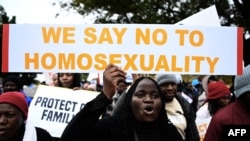A coalition of churches in Botswana has voiced its opposition to parliament's latest effort to amend the constitution to include gay rights.
Botswana’s minister for state president, Kabo Morwaeng, introduced a constitutional amendment bill for the first reading Wednesday. Among proposed amendments is the inclusion of a clause that would “protect and prohibit the discrimination of intersex persons and persons with a disability.”
However, churches are opposed to the move promoting gay rights.
Abraham Kedisang is a pastor at the Apostolic Faith Mission, a church that issued a statement denouncing the effort to amend the constitution.
"As the AFM Botswana, we express our grave concerns regarding the tabling and ultimate debate by parliament of these proposed amendments without the benefit of the people's engagement and contribution,” Kedisang said. “These provisions portend grave threat for our Christian way of life, our democracy and, indeed, our republic as we have known it over the many decades.”
Botswana’s High Court decriminalized same-sex relations in 2019, after a legal challenge. In July 2023, the government proposed a bill to incorporate gay rights into the constitution, but hundreds of opponents protested the development.
Kedisang said the church is right to challenge the proposed changes, despite the court’s 2019 pronouncement.
“The disturbing provision in the constitution [Amendment] bill 2024, No. 4 of 2024, which threatens to destroy the cardinal structure of family life at the heart of Botswana's cherished Christian way of life, through the bringing of ‘intersex’ legal provision that seeks to change the binary male and female structure of our society established and enacted by the almighty God,” Kedisang said.
Lesbians, Gay and Bisexuals of Botswana (LEGABIBO) supported the court challenge in 2019. The group’s chief executive, Thato Moruti, says the constitutional amendments are about protecting human rights and are not a religious issue.
“The nation must separate religious beliefs from human rights matters,” Moruti said. “This issue of decriminalization is a human rights matter, it is not a religious matter. It is an issue that is concerned with reducing systematic disadvantages on other people, especially the LGBTQI persons.”
The government filed a challenge against the 2019 judgment, but the Court of Appeal upheld the initial ruling in 2021.
Moruti said members of the National Assembly have a duty to protect disadvantaged communities.
“As international beacon of democracy, it is very important that as Botswana, we must recognize that this democracy also includes minority groups such as the LGBTQI community. It is important for legislators to remember that their democratic oath is to protect those who are unable to speak for themselves, including members of the LGBTQI community,” Moruti said.
Before the Botswana courts decriminalized homosexuality, the offense was punishable by up to seven years in jail.
Homosexuality remains illegal in most African countries, with some, like Uganda, imposing stiff penalties, including the death sentence.






